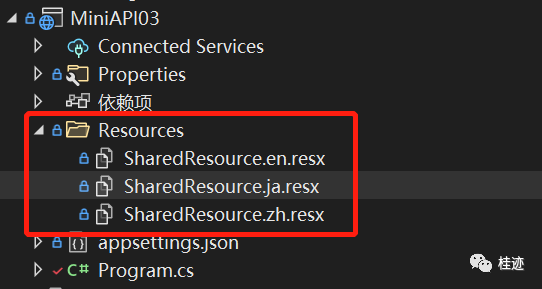.net开发体系里,大部分本地化的实现都是用资源文件实现(.resx),asp.net core中的多语Culture是指区域性的对象,而UICulture 该对象表示资源管理器在运行时查找区域性特定资源时所用的当前用户接口区域性。
asp.net core实现也是通过添注入本地化服务,和添加中间件来实现的,例如下:
using Microsoft.Extensions.Localization;var builder = WebApplication.CreateBuilder(args);
//添加本地化中间件,Resources
builder.Services.AddLocalization(options => options.ResourcesPath = "Resources");var app = builder.Build();
//应用三种本地化资源
var supportedCultures = new[] { "zh-CN", "ja-JP", "en-US" };
var localizationOptions = new RequestLocalizationOptions().SetDefaultCulture(supportedCultures[0]).AddSupportedCultures(supportedCultures).AddSupportedUICultures(supportedCultures);
localizationOptions.ApplyCurrentCultureToResponseHeaders = true;
app.UseRequestLocalization(localizationOptions);
//通过向服务容器中获取StringLocalizer来获取具体本地化数据
app.MapGet("/demo", (IStringLocalizer<SharedResource> sharedLocalizer) =>
{return sharedLocalizer["ok"].Value;
});app.Run();
//ShareResource类型,不需要实现
public class SharedResource
{
}.resx文件类型

.resx文档可视化界面

.resx文件xml数据,分描述部分和数据部分
<?xml version="1.0" encoding="utf-8"?>
<root><!-- Microsoft ResX Schema Version 2.0The primary goals of this format is to allow a simple XML format that is mostly human readable. The generation and parsing of the various data types are done through the TypeConverter classes associated with the data types.Example:... ado.net/XML headers & schema ...<resheader name="resmimetype">text/microsoft-resx</resheader><resheader name="version">2.0</resheader><resheader name="reader">System.Resources.ResXResourceReader, System.Windows.Forms, ...</resheader><resheader name="writer">System.Resources.ResXResourceWriter, System.Windows.Forms, ...</resheader><data name="Name1"><value>this is my long string</value><comment>this is a comment</comment></data><data name="Color1" type="System.Drawing.Color, System.Drawing">Blue</data><data name="Bitmap1" mimetype="application/x-microsoft.net.object.binary.base64"><value>[base64 mime encoded serialized .NET Framework object]</value></data><data name="Icon1" type="System.Drawing.Icon, System.Drawing" mimetype="application/x-microsoft.net.object.bytearray.base64"><value>[base64 mime encoded string representing a byte array form of the .NET Framework object]</value><comment>This is a comment</comment></data>There are any number of "resheader" rows that contain simple name/value pairs.Each data row contains a name, and value. The row also contains a type or mimetype. Type corresponds to a .NET class that support text/value conversion through the TypeConverter architecture. Classes that don't support this are serialized and stored with the mimetype set.The mimetype is used for serialized objects, and tells the ResXResourceReader how to depersist the object. This is currently not extensible. For a given mimetype the value must be set accordingly:Note - application/x-microsoft.net.object.binary.base64 is the format that the ResXResourceWriter will generate, however the reader can read any of the formats listed below.mimetype: application/x-microsoft.net.object.binary.base64value : The object must be serialized with : System.Runtime.Serialization.Formatters.Binary.BinaryFormatter: and then encoded with base64 encoding.mimetype: application/x-microsoft.net.object.soap.base64value : The object must be serialized with : System.Runtime.Serialization.Formatters.Soap.SoapFormatter: and then encoded with base64 encoding.mimetype: application/x-microsoft.net.object.bytearray.base64value : The object must be serialized into a byte array : using a System.ComponentModel.TypeConverter: and then encoded with base64 encoding.--><xsd:schema id="root" xmlns="" xmlns:xsd="http://www.w3.org/2001/XMLSchema" xmlns:msdata="urn:schemas-microsoft-com:xml-msdata"><xsd:import namespace="http://www.w3.org/XML/1998/namespace" /><xsd:element name="root" msdata:IsDataSet="true"><xsd:complexType><xsd:choice maxOccurs="unbounded"><xsd:element name="metadata"><xsd:complexType><xsd:sequence><xsd:element name="value" type="xsd:string" minOccurs="0" /></xsd:sequence><xsd:attribute name="name" use="required" type="xsd:string" /><xsd:attribute name="type" type="xsd:string" /><xsd:attribute name="mimetype" type="xsd:string" /><xsd:attribute ref="xml:space" /></xsd:complexType></xsd:element><xsd:element name="assembly"><xsd:complexType><xsd:attribute name="alias" type="xsd:string" /><xsd:attribute name="name" type="xsd:string" /></xsd:complexType></xsd:element><xsd:element name="data"><xsd:complexType><xsd:sequence><xsd:element name="value" type="xsd:string" minOccurs="0" msdata:Ordinal="1" /><xsd:element name="comment" type="xsd:string" minOccurs="0" msdata:Ordinal="2" /></xsd:sequence><xsd:attribute name="name" type="xsd:string" use="required" msdata:Ordinal="1" /><xsd:attribute name="type" type="xsd:string" msdata:Ordinal="3" /><xsd:attribute name="mimetype" type="xsd:string" msdata:Ordinal="4" /><xsd:attribute ref="xml:space" /></xsd:complexType></xsd:element><xsd:element name="resheader"><xsd:complexType><xsd:sequence><xsd:element name="value" type="xsd:string" minOccurs="0" msdata:Ordinal="1" /></xsd:sequence><xsd:attribute name="name" type="xsd:string" use="required" /></xsd:complexType></xsd:element></xsd:choice></xsd:complexType></xsd:element></xsd:schema><resheader name="resmimetype"><value>text/microsoft-resx</value></resheader><resheader name="version"><value>2.0</value></resheader><resheader name="reader"><value>System.Resources.ResXResourceReader, System.Windows.Forms, Version=4.0.0.0, Culture=neutral, PublicKeyToken=b77a5c561934e089</value></resheader><resheader name="writer"><value>System.Resources.ResXResourceWriter, System.Windows.Forms, Version=4.0.0.0, Culture=neutral, PublicKeyToken=b77a5c561934e089</value></resheader><data name="cancel" xml:space="preserve"><value>Cancel</value></data><data name="no" xml:space="preserve"><value>No</value></data><data name="ok" xml:space="preserve"><value>Yes</value></data>
</root>
使用总结)
)















![linux c之出现warning: implicit declaration of function ‘exit’ [-Wimplicit-function-declaration]这个问题](http://pic.xiahunao.cn/linux c之出现warning: implicit declaration of function ‘exit’ [-Wimplicit-function-declaration]这个问题)
